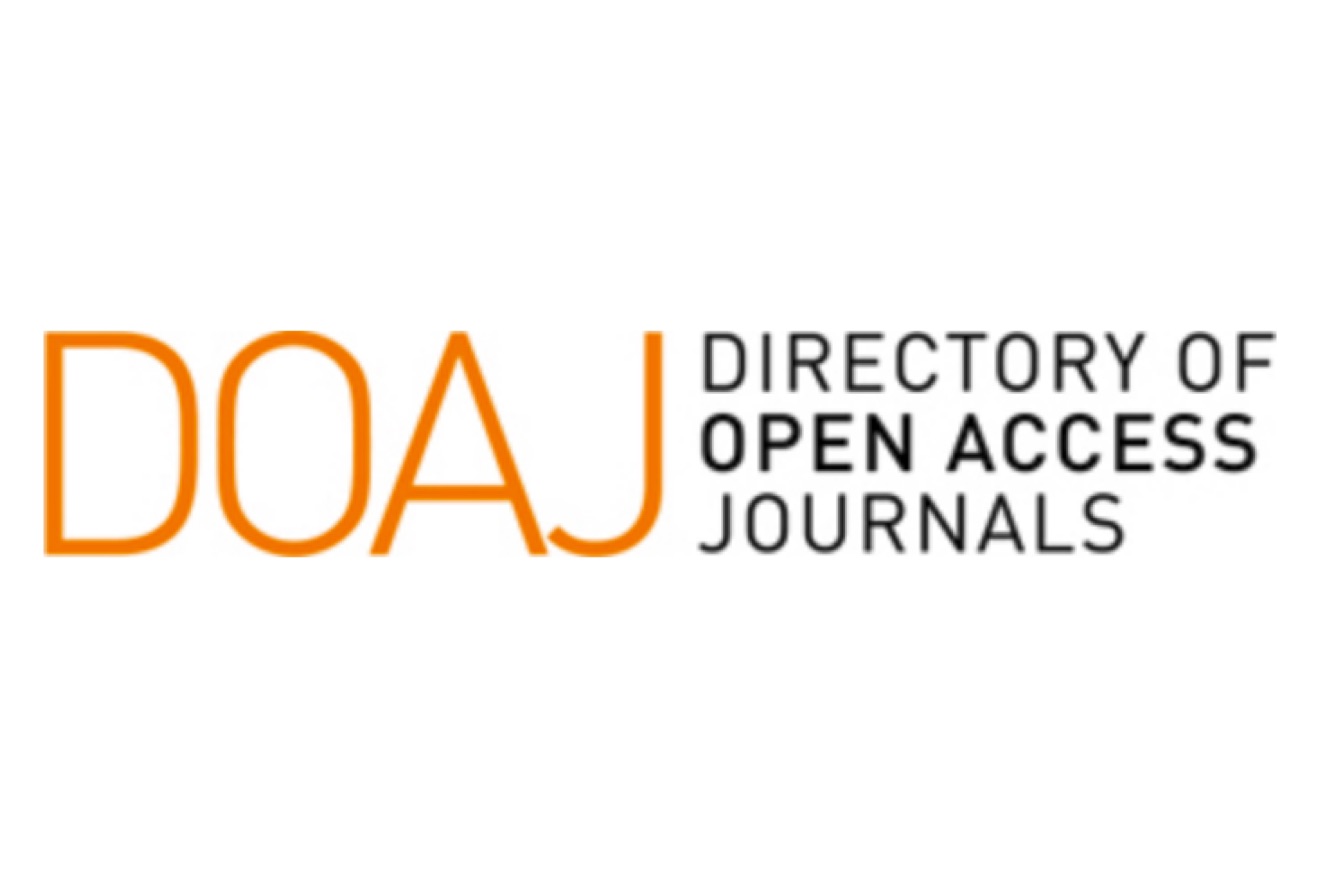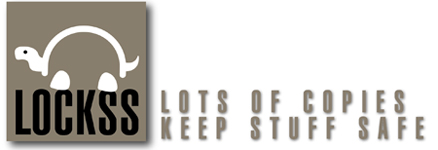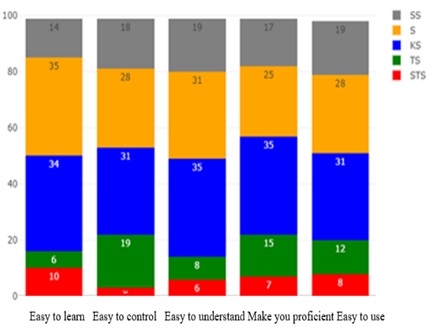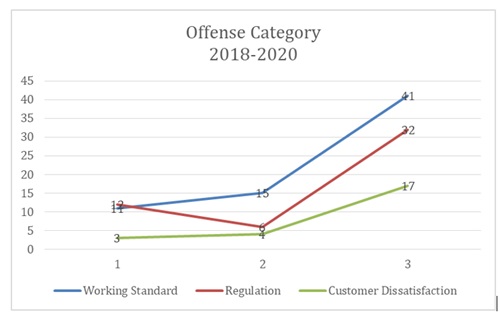Company Performance Analysis with Organizational Learning as a Mediating Variable Studies on the Metal Industry in Kramat District, Tegal Regency
Downloads
The metal industry in the Tegal city experiences a severe shock because of technological disruption and the Covid 19 pandemic. However, the metal industry experiences an organizational learning process and some of the industries are still surviving today. This study aimed to determine the effect of Employee Engagement, Knowledge Management and Organizational Learning on the Performance of the Metal Industry in Tegal Regency, especially in Kramat District, Central Java. The population in this study was the metal industry with a total of 121 units with a total workforce of 382 people. Samples were taken by random purposive sampling technique amounting to 78 respondents. The data analysis method used AMOS with PLS Version 3. The results of the study found that Employee Engagement, Knowledge Management, and Organizational Learning simultaneously had a significant effect on organizational performance. Partially, Employee Engagement had a negative and insignificant effect on Organizational Learning and Organizational Performance. Knowledge Management had a positive and significant effect on Organizational Learning. Organizational learning has a positive effect on organizational performance. However, Organizational Learning was not able to Mediate Employee Engagement on Organizational Performance.
Downloads
Ahmetoglu, G., Harding, X., Akhtar, R., & Chamorro-Premuzic, T. (2015). Predictors of creative achievement: Assessing the impact of entrepreneurial potential, perfectionism, and employee engagement. Creativity Research Journal, 27, 198–205. doi:10.1080/10400419.2015.1030293
Albercht, S. L., Bakker, A. B., Gruman, J. A., Macey, W. H., & Saks, A. M. (2015). Employee engagement, human resource management practices and competitive advantage: An integrated approach. Journal of Organizational Effectiveness: People and Performance, 2, 7–35. doi:10.1108/joepp-08-2014-0042
Barney, J.B. (1991). Firm Resources and Sustained Competitive Advantage. Journal of Management, 1 (17): 99-120
Balkissoon, Kit Fai Pun Marcia Nathai (2011),"Integrating knowledge management into organisational learning", The Learning Organization, Vol. 18 Iss 3 pp. 203 - 223 Permanent link to this document: http://dx.doi.org/10.1108/09696471111123261
Bordia, Peter, J., & Paul, A. (2008) "Construct validity: A Review of Basic Issues and Marketing Practices”, Journal of Marketing Research, Vol. 18 No.23, pp. 133-45
Breevaart, K., Bakker, A., Hetland, J., Demerouti, E., Olsen, O. K., & Espevik, R. (2013). Daily transactional and transformational leadership and daily employee engagement. Journal of Occupational and Organizational Psychology, 87, 138–157. doi:10.1111/joop.12041
Carter, B. (2015, September 29). 4 dramatic shifts in the workplace that will positively affect employee engagement [Blog post]. Retrieved from http://blog.accessdevelopment.com/4-dramatic-shifts-in-the-workplace-that-will-positively-affect-employee-engagement
Castaneda, Delio Ignacio; Manrique, Luisa Fernanda; Cuellar, Sergio (2018). Is organizational learning being absorbed by knowledge management? A systematic review. Journal of Knowledge Management, (), JKM-01-2017-0041–. doi:10.1108/JKM-01-2017-0041
Cascio, W. F. (2006). Managing Human Resources: Productivity, Quality of Life, Profits. McGraw-Hill Irwin.
Chen, B., & Pearl, J. (2015). Graphical tools for linear structural equation modeling. Technical Report, R-432
Chiu, C.N. and Chen, H.H. (2016), "The study of knowledge management capability and organizational effectiveness in Taiwanese public utility: the mediator role of organizational commitment”, SpringerPlus, Vol. 5 No. 1, pp. 1-34.
Cooper-Thomas, H. D., Paterson, N. L., Stadler, M. J., & Saks, A. M. (2014). The relative importance of proactive behaviors and outcomes for predicting newcomer learning, well-being, and work engagement. Journal of Vocational Behavior, 84, 318–331. doi:10.1016/j.jvb.2014.02.007
Correa, Morales, dan Pozo (2007) Leadership and organizational learning's role on innovation and performance: Lessons from Spain; Industrial Marketing Management 36; 349 – 359
Dutta, B. and Madalli, P. (2015) Trends in Knowledge Modelling and Knowledge Management: An Editorial. Journal of Knowledge Management, 19, 1-3. http://dx.doi.org/10.1108/JKM-10-2014-0442.
Farndale, E., & Murrer, I. (2015). Job resources and employee engagement: A cross-national study. Journal of Managerial Psychology, 30, 610–626. doi:10.1108/jmp-09-2013-0318
Fatma Zerah Tan and Gbemi Oladipo Olaore (2021), Effect of organizational learning and effectiveness on the operations, employees productivity and management performance; Vilakshan - XIMB Journal of Management Vol. 19 No. 2, pp. 110-127 Emerald Publishing Limited 0973-1954 DOI 10.1108/XJM-09-2020-0122
Garcia-Perez, A., & Mitra, A. (2008). Tacit knowledge elicitation and measurement in research organisations: A methodological approach
Garcia-Perez, A., & Ayres, R. (2009). Collaborative development of knowledge representations – A novel approach to knowledge elicitation and transfer. Electronic Journal of Knowledge Management, 7(1), 55–62
Garcia-Perez, A., & Ayres, R. (2015). Wikifailure: The limitations of technology for knowledge sharing. Leading Issues in Knowledge Management, Volume Two, 2, 242
Garvin, D.A., Edmondson, A.C. and Gino, F. (2008), "Is yours a learning organisation?”, Harvard Business Review, Vol. 86 No. 3, pp. 109-116.
Huber, G. P. (1991). Organizational learning: The contributing processes and the literatures. Organization Science, 2(1), 88–115.
Iqbal, Amjad; Latif, Fawad; Marimon, Frederic; Sahibzada, Umar Farooq; Hussain, Saddam (2018). From knowledge management to organizational performance. Journal of Enterprise Information Management, (), JEIM-04-2018-0083–. doi:10.1108/JEIM-04-2018-0083
Javed, M.N. and M.R. Mirza, 2013. Determinants of financial performance of a firm: Case of Pakistani stock market; Journal of Economics and International Finance; Vol. 5(2), pp. 43-52, May, 2013 DOI: 10.5897/JEIF12.043 ISSN 2006-9812 ©2013 Academic Journals http://www.academicjournals.org/JEIF
Jimenez dan Navarro (2006), Linking shared organisational context and relational capital through unlearning: An initial empirical investigation in SMEs; Google Scholar
Kazimoto, P. (2016) Employee Engagement and Organizational Performance of Retails Enterprises.
American Journal of Industrial and Business Management, 6, 516-525. http://dx.doi.org/10.4236/ajibm.2016.64047
Khan, W.A. (1990) Psychological Conditions of Personal Engagement and Disengagement of Work. Academy of Management Journal, 33, 692-724. http://dx.doi.org/10.2307/256287
Khandekar dan Sharma (2006) Organizational learning and performance; Journal of Education and Training; volume 48, pages 682-692
Kyoungshin, K. and Zhenqiu, L.L. (2019), "Learning organization and organizational performance”, The Oxford Handbook of the Learning Organization, Oxford University Press, pp. 333-346.
Liao, Shu-hsien, Chi-chuan Wu. (2010). System Perspective of Knowledge Management, Organizational Learning, and Organizational Innovation. Expert System with Applications. v.37 p.1096–1103.
Maniam Kaliannana, Samuel Narh Adjovub; (2015), Effective employee engagement and organizational success: a case study; Procedia - Social and Behavioral Sciences 172 ( 2015 ) 161 – 168
Markos, S and Sridevi, M.S (2010) "Employee Engagement: The Key to Improving Performance”, International Journal of Business and Management Vol. 5, No.12,pp.89-97
Marquardt, M.J. (2019), "Building learning organization with action learning”, The Oxford Handbook of the Learning Organization, Oxford University Press, pp. 105-118.
Masa'deh, R., Obeidat, B. and Tarhini, A. (2016) A Jordanian Empirical Study of the Associations among Transformational Leadership, Transactional Leadership, Knowledge Sharing, Job Performance, and Firm Performance: A Structural Equation Modelling Approach. Journal of Management Development, 35, 681-705.https://doi.org/10.1108/JMD-09-2015-0134
Meere Michael (December 2005). "High cost of disengaged employees”, Victoria: Swinburne University of Technology. Available online at http://swinburne.edu.au/corporate/industrysolutions/ee/reports
Men, L.R. (2015). Employee engagement in relation to employee- organization relationship and internal reputation: effects of leadership and communication. Public Relations Journal, 9 (2),11-22. http://www.prsa.org/intelligence/PR journal /vol9/no2.
Mishra, K., Boynton, L., & Mishra, A. (2014). Driving employee engagement: The expanded role of internal communications. International Journal of Business Communications, 51, 183–202. doi:10.1177/2329488414525399
Ngah, R., Tai, T. and Bontis, N. (2016), "Knowledge management capabilities and organizational performance in roads and transport authority of Dubai: the mediating role of learning organization”, Knowledge and Process Management, Vol. 23 No. 3, pp. 184-193.
Patel, C. (2013). Use of Multimedia Technology in Teaching and Learning Communication Skill: An Analysis. International Journal of Advancements in Research & Technology, 2, 116-123.
Power, J. & Waddell, D. (2004). The link between self-managed work teams and learning organisations using performance indicators. The Learning Organization, 11(3), 244-259.
Ramachandran, S.D., Chong, S.C. and Wong, K.Y. (2013), "Knowledge management practices and enablers in public universities: a gap analysis”, Campus-Wide Information Systems, Vol. 30 No. 2, pp. 76-94
Reese, S. (2020), "Taking the learning organization mainstream and beyond the organizational level: an interview with peter senge”, The Learning Organization, Vol. 27 No. 1, pp. 6-16
Schaufeli, W. B., & Bakker, A. B. (2010). Defining and measuring work engagement: Bringing clarity to the concept. In A. B. Bakker (Ed.) & M. P. Leiter, Work engagement: A handbook of essential theory and research (pp. 10–24). Psychology Press.
Shahzad, K., Bajwa, S.U., Siddiqi, A.F.I., Ahmid, F. and Raza Sultani, A. (2016), "Integrating Knowledge Management (KM) strategies and processes to enhance organizational creativity and performance: an empirical investigation”, Journal of Modelling in Management, Vol. 11 No. 1, pp. 154-179.
Skerlavaj, Stemberger, Skrinjar dan Dimovski (2007) Organizational learning culture”the missing link between business process change and organizational performance; International Journal of Production Economics Volume 106, Issue 2, Pages 346-367
Song, S., Nerur, S., & Teng, J. T. (2007). An exploratory study on the roles of network structure and knowledge processing orientation in work unit knowledge management. ACM SIGMIS Database, 38(2), 8–26.
Stannack, P. (1996). Perspective on Employees Performance. Management Research News, l19(4/5), 38-40.
Storberg-Walker, J., & Gubbins, C. (2007). Social networks as a conceptual and empirical tool to understand and "do” HRD. Advances in Developing Human Resources, 9(3), 291–310.
Vandenabeele, W. (2014). Explaining public service motivation: The role of leadership and basic needs satisfaction. Review of Public Personnel Administration, 34, 153–173. doi:10.1177/0734371x14521458
Van Zyl, L.E., Deacon, E., & Rothmann, S. Towards happiness: Experiences of work-role fit, meaningfulness and work engagement of industrial/organisational psychologists in South Africa. SA Journal of Industrial Psychology/SA Tydskrif vir Bedryfsielkunde, 36(1), Art. #890, 10 pages. DOI: 10.4102/sajip.v36i1.890
Wong, K.K.K. (2013) Partial Least Squares Structural Equation Modeling. In: Homburg, C., Klarmann, M. and Vomberg, A.E., Eds., Handbook of Market Research, Springer, Cham, 1-47.
JMIL Jurnal Manajemen Industri dan Logistik (Journal of Industrial and Logistics Management) is an Open Access Journal. The authors who publish the manuscript in JMIL Jurnal Manajemen Industri dan Logistik agree to the following terms:

JMIL Jurnal Manajemen Industri dan Logistik is licensed under a Creative Commons Attribution 4.0 International License. This permits anyone to copy, redistribute, remix, transmit and adapt the work provided the original work and source is appropriately cited.
This means:
(1) Under the CC-BY license, authors retain ownership of the copyright for their article, but authors grant others permission to use the content of publications in JMIL Jurnal Manajemen Industri dan Logistik in whole or in part provided that the original work is properly cited. Users (redistributors) of JMIL Jurnal Manajemen Industri dan Logistik are required to cite the original source, including the author's names, JMIL Jurnal Manajemen Industri dan Logistik as the initial source of publication, year of publication, volume number, issue, and Digital Object Identifier (DOI); (2) Authors grant JMIL Jurnal Manajemen Industri dan Logistik the right of first publication. Although authors remain the copyright owner.





























